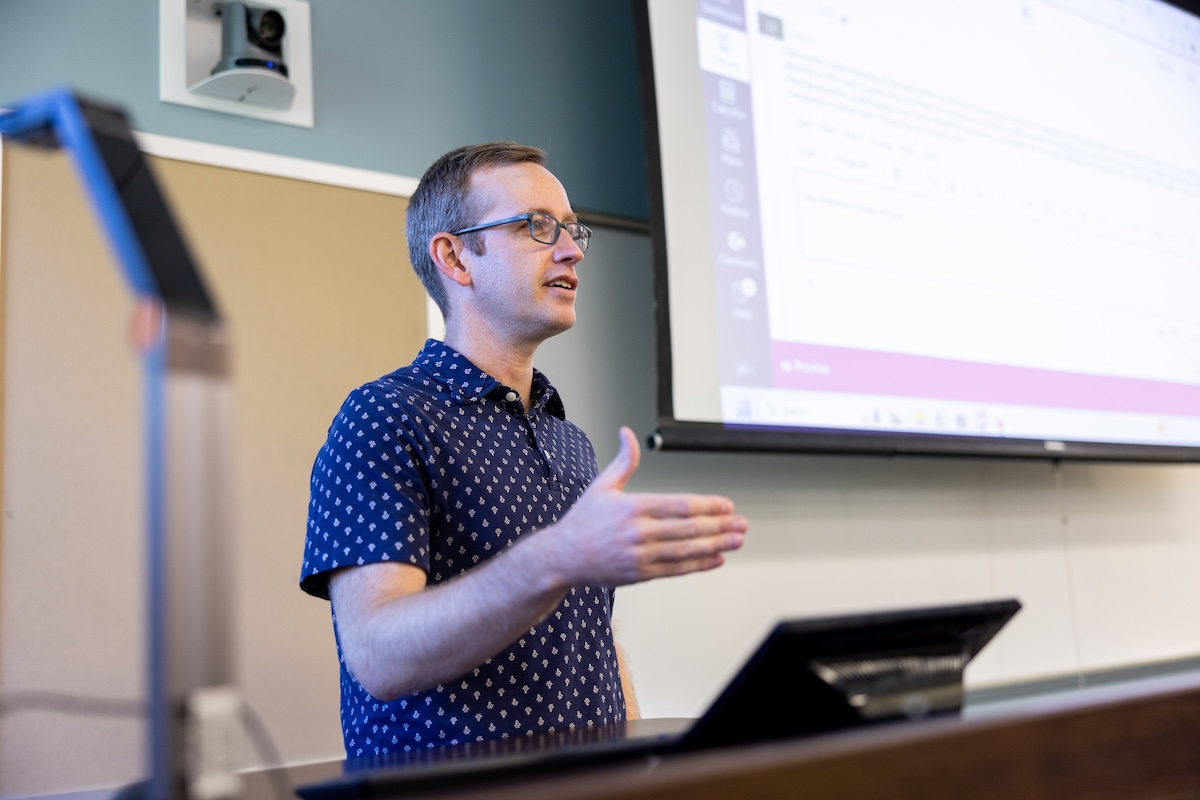Associate Professor of Communication and Digital Studies
Department Chair and Director of the Minor in Digital Studies
Education
- Ph.D., English and Digital Media, University of Florida
- M.A., English, University of Florida
- B.A., Philosophy and English, Carson Newman College
Biography
Zach Whalen is an Associate Professor at the University of Mary Washington where he teaches courses on creative coding, game studies, comics, and electronic literature. He is the co-editor (with Chris Foss and Jonathan W. Gray) of Disability in Comic Books and Graphic Narratives and (with Laurie N. Taylor) of Playing the Past: History and Nostalgia in Video Games. He is completing a scholarly monograph on computer-generated literary and artistic books. In addition to research and writing about electronic literature, Zach is a practitioner of computational creativity including tiny digital poems in Taper, several dozen artistic or literary Twitter bots (R.I.P.), and the graphic novel, An Arthrogram.
Zach Whalen is a Board Member for the Electronic Literature Organization and will be Lead Editor for Volume 5 of the Electronic Literature Collection. He is also an annual contributor to NaNoGenMo (National Novel Generation Month) and a member of the Community Advisory Board for If, Then: Technology and Poetics.
Recent and selected publications by Zach Whalen.
“‘Any Means Necessary to Refuse Erasure by Algorithm:’ Lillian-Yvonne Bertram’s Travesty Generator”
Digital Humanities Quarterly. 17:2 (2023). http://digitalhumanities.org/dhq/vol/17/2/000707/000707.html
“The 2020 Presidential Debate But Only the Parts Where Someone Breathes Loudly or Sighs”
Hyperrhiz: New Media Cultures. 26 (2023). http://hyperrhiz.io/hyperrhiz26/artist-statements/presidential-breathing.html
“The Many Authors of The Several Houses of Brian, Spencer, Liam, Victoria, Brayden, Vincent, and Alex: Authorship, Agency, and Appropriation”
The Journal of Creative Writing Studies. 4:1 (2019). https://scholarworks.rit.edu/jcws/vol4/iss1/
Conference Participation
“Data Bookification: Image, Place, Event”
2024 Conference of the Electronic Literature Organization, July 19, 2024.Online. <https://stars.library.ucf.edu/elo2024/hypertextsandfictions/schedule/16/>
“Wilderness Walk: Computational Literary Approaches to the Digital Environmental Humanities”
2024 Keystone Digital Humanities Conference, May 20, 2024. Erie, PA.
“Data Poetics, Computational Literature, and the Medium of Books”
2024 Northeast Modern Language Association Convention, March 9, 2024. Boston, MA.
“The Second Book Ever Written by a Computer (has not yet been written)”
2023 Modern Language Association Convention, January 5, 2024. Philadelphia, PA.
“Formal Fakery: High Entropy Essays from the Pomo Generator to ChatGPT.”
2023 Conference of the Electronic Literature Organization. July 14, 2023. Coimbra, Portugal / Online.
“The Incommensurability of Computer-Generated Comics.”
2022 Conference of the Society for Literature, Science, and the Arts. October 6, 2022. West Lafayette, IN.
“Can a Computer-Generated Book Matter?: NaNoGenMo as Critical Media Art”
2022 Conference of the Electronic Literature Organization. May 20, 2022. Online.
“Reading Energy Crisis Poems”
2021 Conference of the Society for Literature, Science, and the Arts. October 2, 2021. Online.
Invited Lectures
“Data Poetics, Computational Literature, and the Medium of Books“
UMW Social Research Colloquium, February 22, 2024.
“ChatGPT is not a Tool“
UMW Faculty Pedagogy Colloquium, April 4, 2023.
Workshop on Computer-Generated Books
If, Then: Technology and Poetics, October 18, 2021. Online.
Media Appearances
“The Arcade”
Segment on With Good Reason, “The Wide World of Video Games,” September 10, 2021.
DGST 101: Introduction to Digital Studies
Introduces an interdisciplinary approach to using technology and specifically provides a foundation for the Digital Studies Minor. Coursework may include digital approaches to creavity, historiography, media analysis and thinking critically about and through digital culture.
DGST 302: Creative Coding
Introduces students to programming for creative purposes including computer-generated literature, art and animation.
DGST 395: Applied Digital Studies
Apply the skills and methodologies developed in the Digital Studies curriculum toward larger-scale, self-designed digital projects that contribute meaningfully to some cultural field, academic discipline, social issue, or other research question.
ENGL 253: Games and Culture
A critical exploration of cultural value in video games–including issues of gender, race, sexuality, class, labor and disability–and the ways by which contemporary and historical games demonstrate, respond to, or represent those concerns.
ENGL 350: Electronic Literature
A survey of born digital literature including: hypertext fiction, interactive fiction, playable media, net.art, and other genres of literary work produced and experienced through computers.
ENGL 386: The Graphic Novel
A study of the graphic novel form, including the analysis of graphic novel texts, the integration of related critical theory, and experimentation with producing graphic narrative. Specific topics and themes may include formal approaches to the medium, as well as issues of race, class, and gender as represented in graphic novels.

